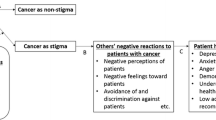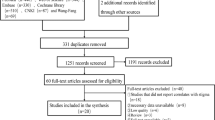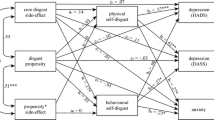Abstract
Disgust-driven stigma may be motivated by an assumption that a stigmatized target presents a disease threat, even in the absence of objective proof. Accordingly, even non-contagious diseases, such as cancer, can become stigmatized by eliciting disgust. This study had two parts: a survey (n = 272), assessing the association between disgust traits and cancer stigma; and an experiment, in which participants were exposed to a cancer surgery (n = 73) or neutral video (n = 68), in order to test a causal mechanism for the abovementioned association. Having a higher proneness to disgust was associated with an increased tendency to stigmatize people with cancer. Further, a significant causal pathway was observed between disgust propensity and awkwardness- and avoidance-based cancer stigma via elevated disgust following cancer surgery exposure. In contrast, those exposed to cancer surgery not experiencing elevated disgust reported less stigma than controls. Exposure-based interventions, which do not elicit disgust, may be profitable in reducing cancer stigma.

Similar content being viewed by others
References
Aarøe, L., Petersen, M. B., & Arceneaux, K. (2017). The behavioral immune system shapes political intuitions: Why and how individual differences in disgust sensitivity underlie opposition to immigration. American Political Science Review,111, 277–294. https://doi.org/10.1017/S0003055416000770
Albrecht, G. L., Walker, V. G., & Levy, J. A. (1982). Social distance from the stigmatized: A test of two theories. Social Science and Medicine,16, 1319–1327. https://doi.org/10.1016/0277-9536(82)90027-2
Athey, A. J., Elias, J. A., Crosby, J. M., Jenike, M. A., Pope, H. G., Hudson, J. I., et al. (2015). Reduced disgust propensity is associated with improvement in contamination/washing symptoms in obsessive-compulsive disorder. Journal of Obsessive-Compulsive and Related Disorders,4, 20–24. https://doi.org/10.1016/j.jocrd.2014.11.001
Azlan, H. A., Overton, P. G., Simpson, J., & Powell, P. A. (2017). Differential disgust responding in people with cancer and implications for psychological wellbeing. Psychology and Health,32, 19–37. https://doi.org/10.1080/08870446.2016.1235165
Berman, S. H., & Wandersman, A. (1990). Fear of cancer and knowledge of cancer: A review and proposed relevance to hazardous waste sites. Social Science and Medicine,31, 81–90. https://doi.org/10.1016/0277-9536(90)90013-I
Bloom, J. R., & Kessler, L. (1994). Emotional support following cancer: A test of the stigma and social activity hypotheses. Journal of Health and Social Behavior,35, 118–133.
Chapman, H. A., & Anderson, A. K. (2012). Understanding disgust. Annals of the New York Academy of Sciences,1251, 62–76. https://doi.org/10.1111/j.1749-6632.2011.06369.x
Cho, J., Smith, K., Choi, E. K., Kim, I. R., Chang, Y. J., Park, H. Y., et al. (2013). Public attitudes toward cancer and cancer patients: A national survey in Korea. Psycho-Oncology,22, 605–613. https://doi.org/10.1002/pon.3041
Cohen, J. (1992). A power primer. Psychological Bulletin,122, 155–159. https://doi.org/10.1037/0033-2909.112.1.155
Consedine, N. S., & Moskowitz, J. T. (2007). The role of discrete emotions in health outcomes: A critical review. Applied and Preventive Psychology,12, 59–75. https://doi.org/10.1016/j.appsy.2007.09.001
Costa, E. F., Nogueira, T. E., de Souza Lima, N. C., Mendonça, E. F., & Leles, C. R. (2014). A qualitative study of the dimensions of patients’ perceptions of facial disfigurement after head and neck cancer surgery. Special Care in Dentistry,34, 114–121. https://doi.org/10.1111/scd.12039
Courtwright, A. M. (2009). Justice, stigma, and the new epidemiology of health disparities. Bioethics,23, 90–96. https://doi.org/10.1111/j.1467-8519.2008.00717.x
Curtis, V., Aunger, R., & Rabie, T. (2004). Evidence that disgust evolved to protect from risk of disease. Proceedings of the Royal Society B: Biological Sciences,271, 131–133. https://doi.org/10.1098/rsbl.2003.0144
Curtis, V., de Barra, M., & Aunger, R. (2011). Disgust as an adaptive system for disease avoidance behaviour. Philosophical Transactions of the Royal Society of London B: Biological Sciences,366, 389–401. https://doi.org/10.1098/rstb.2010.0117
Deacon, B., & Olatunji, B. O. (2007). Specificity of disgust sensitivity in the prediction of behavioral avoidance in contamination fear. Behaviour Research and Therapy,45, 2110–2120. https://doi.org/10.1016/j.brat.2007.03.008
Efron, B. (1987). Better bootstrap confidence intervals. Journal of the American Statistical Association,82, 171–185. https://doi.org/10.1080/01621459.1987.10478410
Ekman, P. (1992). An argument for basic emotions. Cognition and Emotion,6, 169–200. https://doi.org/10.1080/02699939208411068
Faul, F., Erdfelder, E., Lang, A. G., & Buchner, A. (2007). G* Power 3: A flexible statistical power analysis program for the social, behavioral, and biomedical sciences. Behavior Research Methods,39, 175–191. https://doi.org/10.3758/BF03193146
Fife, B. L., & Wright, E. R. (2000). The dimensionality of stigma: A comparison of its impact on the self of persons with HIV/AIDS and cancer. Journal of Health and Social Behavior. https://doi.org/10.2307/2676360
Fleischman, D. S., Hamilton, L. D., Fessler, D. M. T., & Meston, C. M. (2015). Disgust versus lust: Exploring the interactions of disgust and fear with sexual arousal in women. PLoS ONE,10, e0118151. https://doi.org/10.1371/journal.pone.0118151
Fox, J. (2008). Applied regression analysis and generalized linear models (2nd ed.). London: Sage.
Gayner, B., Esplen, M. J., DeRoche, P., Wong, J., Bishop, S., Kavanagh, L., et al. (2012). A randomized controlled trial of mindfulness-based stress reduction to manage affective symptoms and improve quality of life in gay men living with HIV. Journal of Behavioral Medicine,35, 272–285. https://doi.org/10.1007/s10865-011-9350-8
Gelman, A. (2008). Scaling regression inputs by dividing by two standard deviations. Statistics in Medicine,27, 2865–2873. https://doi.org/10.1002/sim.3107
Gilbert, P. (2010). An introduction to compassion focused therapy in cognitive behavior therapy. International Journal of Cognitive Therapy,3, 97–112. https://doi.org/10.1521/ijct.2010.3.2.97
Goetz, A. R., Cougle, J. R., & Lee, H. J. (2013). Revisiting the factor structure of the 12-item Disgust Propensity and Sensitivity Scale–Revised: Evidence for a third component. Personality and Individual Differences,55, 579–584. https://doi.org/10.1016/j.paid.2013.04.029
Goffman, E. (1963). Stigma: Notes on the management of a spoiled identity. Englewood Cliffs, NJ: Prentice Hall.
Grecucci, A., Theuninck, A., Frederickson, J., & Job, R. (2015). Mechanisms of social emotion regulation: From neuroscience to psychotherapy. In M. L. Bryant (Ed.), Handbook on emotion regulation: Processes, cognitive effects and social consequences (pp. 57–84). New York, NY: Nova Publishing.
Greene, M. G., & Adelman, R. D. (2003). Physician–older patient communication about cancer. Patient Education and Counseling,50, 55–60. https://doi.org/10.1016/S0738-3991(03)00081-8
Haidt, J., McCauley, C., & Rozin, P. (1994). Individual differences in sensitivity to disgust: A scale sampling seven domains of disgust elicitors. Personality and Individual Differences,16, 701–713. https://doi.org/10.1016/0191-8869(94)90212-7
Hayes, A. F., & Scharkow, M. (2013). The relative trustworthiness of inferential tests of the indirect effect in statistical mediation analysis: Does method really matter? Psychological Science,24, 1918–1927. https://doi.org/10.1177/0956797613480187
Hodson, G., Choma, B. L., Boisvert, J., Hafer, C. L., MacInnis, C. C., & Costello, K. (2013). The role of intergroup disgust in predicting negative outgroup evaluations. Journal of Experimental Social Psychology,49, 195–205. https://doi.org/10.1016/j.jesp.2012.11.002
Inbar, Y., Pizarro, D. A., Knobe, J., & Bloom, P. (2009). Disgust sensitivity predicts intuitive disapproval of gays. Emotion,9, 435–439. https://doi.org/10.1037/a0015960
Knapp, S., Marziliano, A., & Moyer, A. (2014). Identity threat and stigma in cancer patients. Health Psychology Open. https://doi.org/10.1177/2055102914552281
Link, B. G., & Phelan, J. C. (2006). Stigma and its public health implications. The Lancet,367, 528–529. https://doi.org/10.1016/S0140-6736(06)68184-1
Luoma, J. B., & Platt, M. G. (2015). Shame, self-criticism, self-stigma, and compassion in Acceptance and Commitment Therapy. Current Opinion in Psychology,2, 97–101. https://doi.org/10.1016/j.copsyc.2014.12.016
Lupton, D. (2015). The pedagogy of disgust: The ethical, moral and political implications of using disgust in public health campaigns. Critical Public Health,25, 4–14. https://doi.org/10.1080/09581596.2014.885115
Mallinckrodt, B., Abraham, W. T., Wei, M., & Russell, D. W. (2006). Advances in testing the statistical significance of mediation effects. Journal of Counseling Psychology,53, 372–378. https://doi.org/10.1037/0022-0167.53.3.372
Marlow, L. A., Waller, J., & Wardle, J. (2015). Does lung cancer attract greater stigma than other cancer types? Lung Cancer,88, 104–107. https://doi.org/10.1016/j.lungcan.2015.01.024
Marlow, L. A., & Wardle, J. (2014). Development of a scale to assess cancer stigma in the non-patient population. BMC Cancer,14, 1–12. https://doi.org/10.1186/1471-2407-14-285
Masuda, A., Hayes, S. C., Fletcher, L. B., Seignourel, P. J., Bunting, K., Herbst, S. A., et al. (2007). Impact of acceptance and commitment therapy versus education on stigma toward people with psychological disorders. Behaviour Research and Therapy,45, 2764–2772. https://doi.org/10.1016/j.brat.2007.05.008
McCambridge, S. A., & Consedine, N. S. (2014). For whom the bell tolls: Experimentally-manipulated disgust and embarrassment may cause anticipated sexual healthcare avoidance among some people. Emotion,14, 407–415. https://doi.org/10.1037/a0035209
Navarrete, C. D., & Fessler, D. M. (2006). Disease avoidance and ethnocentrism: The effects of disease vulnerability and disgust sensitivity on intergroup attitudes. Evolution and Human Behavior,27, 270–282. https://doi.org/10.1016/j.evolhumbehav.2005.12.001
Nemeroff, C., & Rozin, P. (1994). The contagion concept in adult thinking in the United States: Transmission of germs and of interpersonal influence. Ethos,22, 158–186. https://doi.org/10.1525/eth.1994.22.2.02a00020/full
Neuberg, S. L., Kenrick, D. T., & Schaller, M. (2011). Human threat management systems: Self-protection and disease avoidance. Neuroscience and Biobehavioral Reviews,35, 1042–1051. https://doi.org/10.1016/j.neubiorev.2010.08.011
Oaten, M., Stevenson, R. J., & Case, T. I. (2009). Disgust as a disease-avoidance mechanism. Psychological Bulletin,135, 303–321. https://doi.org/10.1037/a0014823
Oaten, M., Stevenson, R. J., & Case, T. I. (2011). Disease avoidance as a functional basis for stigmatization. Philosophical Transactions of the Royal Society of London B: Biological Sciences,366, 3433–3452. https://doi.org/10.1098/rstb.2011.0095
Olatunji, B. O. (2008). Disgust, scrupulosity and conservative attitudes about sex: Evidence for a mediational model of homophobia. Journal of Research in Personality,42, 1364–1369. https://doi.org/10.1016/j.jrp.2008.04.001
Olatunji, B. O., Cisler, J. M., Deacon, B. J., Connolly, K., & Lohr, J. M. (2007a). The disgust propensity and sensitivity scale-revised: Psychometric properties and specificity in relation to anxiety disorder symptoms. Journal of Anxiety Disorders,21, 918–930. https://doi.org/10.1016/j.anxdis.2006.12.005
Olatunji, B. O., Williams, N. L., Tolin, D. F., Abramowitz, J. S., Sawchuk, C. N., Lohr, J. M., et al. (2007b). The Disgust Scale: Item analysis, factor structure, and suggestions for refinement. Psychological Assessment,19, 281–297. https://doi.org/10.1037/1040-3590.19.3.281
Pagnini, F., Manzoni, G. M., Castelnuovo, G., & Molinari, E. (2013). A brief literature review about relaxation therapy and anxiety. Body, Movement and Dance in Psychotherapy,8, 71–81. https://doi.org/10.1080/17432979.2012.750248
Powell, P. A., Azlan, H. A., Simpson, J., & Overton, P. G. (2016). The effect of disgust-related side-effects on symptoms of depression and anxiety in people treated for cancer: A moderated mediation model. Journal of Behavioral Medicine,39, 560–573. https://doi.org/10.1007/s10865-016-9731-0
Powell, P. A., Simpson, J., & Overton, P. G. (2015). Self-affirming trait kindness regulates disgust toward one’s physical appearance. Body Image,12, 98–107. https://doi.org/10.1016/j.-bodyim.2014.10.006
Pryor, J. B., Reeder, G. D., Yeadon, C., & Hesson-McInnis, M. (2004). A dual-process model of reactions to perceived stigma. Journal of Personality and Social Psychology,87, 436–452. https://doi.org/10.1037/0022-3514.87.4.436
Quinn, D. M., & Chaudoir, S. R. (2009). Living with a concealable stigmatized identity: The impact of anticipated stigma, centrality, salience, and cultural stigma on psychological distress and health. Journal of Personality and Social Psychology,97, 634–651. https://doi.org/10.1037/a0015815
Reynolds, L. M., Consedine, N. S., & McCambridge, S. A. (2014a). Mindfulness and disgust in colorectal cancer scenarios: Non-judging and non-reacting components predict avoidance when it makes sense. Mindfulness,5, 442–452. https://doi.org/10.1007/s12671-013-0200-3
Reynolds, L. M., Consedine, N. S., Pizarro, D. A., & Bissett, I. P. (2013). Disgust and behavioral avoidance in colorectal cancer screening and treatment: A systematic review and research agenda. Cancer Nursing,36, 122–130. https://doi.org/10.1097/NCC.0b013e31826a4b1b
Reynolds, L. M., Lin, Y. S., Zhou, E., & Consedine, N. S. (2015a). Does a brief state mindfulness induction moderate disgust-driven social avoidance and decision-making? An experimental investigation. Journal of Behavioral Medicine,38, 98–109. https://doi.org/10.1007/s10865-014-9582-5
Reynolds, L. M., McCambridge, S. A., Bissett, I. P., & Consedine, N. S. (2014b). Trait and state disgust: an experimental investigation of disgust and avoidance in colorectal cancer decision scenarios. Health Psychology,33, 1495–1506. https://doi.org/10.1037/hea0000023
Reynolds, L. M., McCambridge, S. A., & Consedine, N. S. (2015b). Self-disgust and adaptation to chronic physical health conditions: Implications for avoidance and withdrawal. In P. A. Powell, P. G. Overton, & J. Simpson (Eds.), The revolting self: Perspectives on the psychological, social, and clinical implications of self-directed disgust (pp. 75–88). London: Karnac.
Reynolds, L. M., Powell, P., Lin, Y. S., Ravi, K., Chung, C.-Y. K., & Consedine, N. S. (2019). Fighting the flinch: Experimentally induced compassion makes a difference in health care providers. British Journal of Health Psychology,24, 982–998. https://doi.org/10.1111/bjhp.12390
Rosman, S. (2004). Cancer and stigma: Experience of patients with chemotherapy-induced alopecia. Patient Education and Counseling,52, 333–339. https://doi.org/10.1016/S0738-3991(03)00040-5
Rozin, P. (2008). Hedonic ‘adaptation’: Specific habituation to disgust/death elicitors as a result of dissecting a cadaver. Judgment and Decision Making,3, 191–194.
Rozin, P., & Fallon, A. E. (1987). A perspective on disgust. Psychological Review,94, 23–41. https://doi.org/10.1037/0033-295X.94.1.23
Rozin, P., Haidt, J., McCauley, C., Dunlop, L., & Ashmore, M. (1999). Individual differences in disgust sensitivity: Comparisons and evaluations of paper-and-pencil versus behavioral measures. Journal of Research in Personality,33, 330–351. https://doi.org/10.1006/jrpe.1999.2251
Schaller, M. (2011). The behavioural immune system and the psychology of human sociality. Philosophical Transactions of the Royal Society of London B: Biological Sciences,366, 3418–3426. https://doi.org/10.1098/rstb.2011.0029
Schaller, M., & Park, J. H. (2011). The behavioral immune system (and why it matters). Current Directions in Psychological Science,20, 99–103. https://doi.org/10.1177/0963721411402596
Scheel, J. R., Molina, Y., Anderson, B. O., Patrick, D. L., Nakigudde, G., Gralow, J. R., et al. (2017). Breast cancer beliefs as potential targets for breast cancer awareness efforts to decrease late-stage presentation in Uganda. Journal of Global Oncology,4, 1–9. https://doi.org/10.1200/JGO.2016.008748
Sirey, J. A., Bruce, M. L., Alexopoulos, G. S., Perlick, D. A., Raue, P., Friedman, S. J., et al. (2001). Perceived stigma as a predictor of treatment discontinuation in young and older outpatients with depression. American Journal of Psychiatry,158, 479–481. https://doi.org/10.1176/appi.ajp.158.3.479
Skinta, M. D., Lezama, M., Wells, G., & Dilley, J. W. (2015). Acceptance and compassion-based group therapy to reduce HIV stigma. Cognitive and Behavioral Practice,22, 481–490. https://doi.org/10.1016/j.cbpra.2014.05.006
Smith, D. M., Loewenstein, G., Rozin, P., Sherriff, R. L., & Ubel, P. A. (2007). Sensitivity to disgust, stigma, and adjustment to life with a colostomy. Journal of Research in Personality,41, 787–803. https://doi.org/10.1016/j.jrp.2006.09.006
Stevenson, R. J., Case, T. I., & Oaten, M. J. (2009). Frequency and recency of infection and their relationship with disgust and contamination sensitivity. Evolution and Human Behavior,30, 363–368. https://doi.org/10.1016/j.evolhumbehav.2009.02.005
Threader, J., & McCormack, L. (2016). Cancer-related trauma, stigma and growth: the ‘lived’experience of head and neck cancer. European Journal of Cancer Care,25, 157–169. https://doi.org/10.1111/ecc.12320
Tod, A. M., Craven, J., & Allmark, P. (2008). Diagnostic delay in lung cancer: a qualitative study. Journal of Advanced Nursing,61, 336–343. https://doi.org/10.1111/j.1365-2648.2007.04542.x
van Overveld, M., de Jong, P. J., & Peters, M. L. (2010). The disgust propensity and sensitivity scale–revised: Its predictive value for avoidance behavior. Personality and Individual Differences,49, 706–711. https://doi.org/10.1016/j.paid.2010.06.008
van Overveld, M., de Jong, P. J., Peters, M. L., Cavanagh, K., & Davey, G. C. L. (2006). Disgust propensity and disgust sensitivity: Separate constructs that are differentially related to specific fears. Personality and Individual Differences,41, 1241–1252. https://doi.org/10.1016/j.paid.2006.04.021
van Overveld, M., de Jong, P. J., Peters, M. L., van Hout, W. J. P. J., & Bouman, T. K. (2008). An internet-based study on the relation between disgust sensitivity and emetophobia. Journal of Anxiety Disorders,22, 524–531. https://doi.org/10.1016/j.janxdis.2007.04.001
Vartanian, L. R. (2010). Disgust and perceived control in attitudes toward obese people. International Journal of Obesity,34, 1302–1307. https://doi.org/10.1038/ijo.2010.45
Walch, S. E., Sinkkanen, K. A., Swain, E. M., Francisco, J., Breaux, C. A., & Sjoberg, M. D. (2012). Using intergroup contact theory to reduce stigma against transgender individuals: Impact of a transgender speaker panel presentation. Journal of Applied Social Psychology,42, 2583–2605. https://doi.org/10.1111/j.15591816.2012.00955.x
Wash, R., Rader, E., & Fennell, C. (2017). Can people self-report security accurately?: Agreement between self-report and behavioral measures. In Proceedings of the 2017 CHI conference on human factors in computing systems (pp. 2228–2232). ACM.
Funding
This research was supported by a postgraduate studentship grant to Haffiezhah Azlan from MARA Education Sponsorship Division, Malay for Indigenous People’s Trust Council (MARA), MARA Head Office 21, Jalan Raja Laut 50609 Kuala Lumpur: 330408224812.
Author information
Authors and Affiliations
Corresponding author
Ethics declarations
Conflict of interest
Haffiezhah A. Azlan, Paul G. Overton, Jane Simpson, and Philip A. Powell declare that they have no conflict of interest.
Ethical approval
All procedures performed in studies involving human participants were in accordance with the ethical standards of the institutional research committee (Department of Psychology Ethics Committee, University of Sheffield) and with the 1964 Helsinki declaration and its later amendments or comparable ethical standards.
Human and animal rights and Informed consent
All procedures followed were in accordance with ethical standards of the responsible committee on human experimentation (institutional and national) and with the Helsinki Declaration of 1975, as revised in 2000. Informed consent was obtained from all patients for being included in the study.
Additional information
Publisher's Note
Springer Nature remains neutral with regard to jurisdictional claims in published maps and institutional affiliations.
Electronic supplementary material
Below is the link to the electronic supplementary material.
Rights and permissions
About this article
Cite this article
Azlan, H.A., Overton, P.G., Simpson, J. et al. Disgust propensity has a causal link to the stigmatization of people with cancer. J Behav Med 43, 377–390 (2020). https://doi.org/10.1007/s10865-019-00130-4
Received:
Accepted:
Published:
Issue Date:
DOI: https://doi.org/10.1007/s10865-019-00130-4




